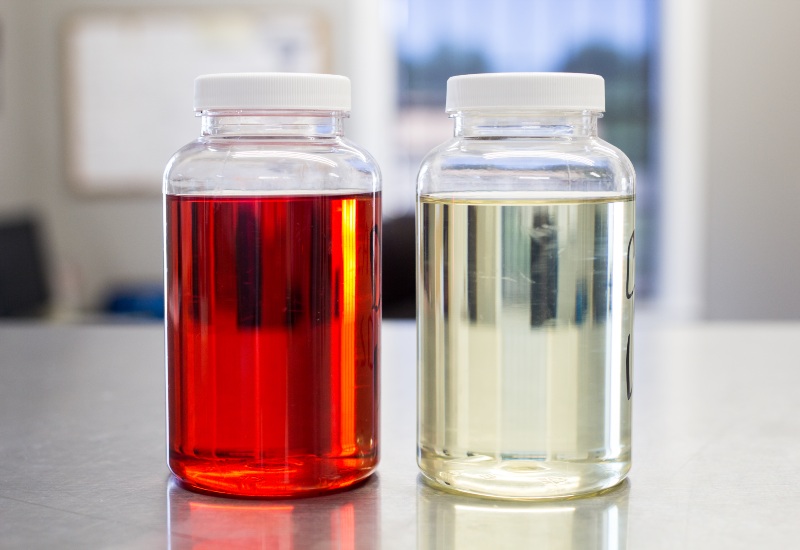What Is Fuel Contamination?
What Is Fuel Contamination?
Fuel contamination is a widespread issue that can impact everything from diesel engines to aircraft performance. Whether you’re dealing with diesel fuel contamination in transportation fleets or jet fuel contamination in aviation, keeping fuel clean is crucial for efficiency and safety. Contaminants in fuel can lead to engine failures, increased maintenance costs, and significant operational disruptions.
At Red River Oil Company, we help businesses and individuals in Texas, Arkansas, Oklahoma, and Louisiana maintain high-quality fuel standards to avoid costly contamination issues. In this guide, we’ll explain what fuel contamination is, its causes, how to identify and treat it, and ways to prevent it.

Understanding Fuel Contamination and How to Prevent It
Fuel contamination occurs when unwanted substances make their way into fuel, degrading its quality and performance. Contaminants can be anything from water and microbes to dirt and metal particles. These impurities reduce fuel efficiency, damage engines, and even pose safety risks in industries like transportation and aviation. Different types of fuel contamination affect various industries, including:
- Diesel fuel contamination: Common in commercial and industrial vehicles, leading to poor engine performance.
- Aircraft fuel contamination: A serious issue that can affect flight safety.
- Jet fuel contamination: Impurities in jet fuel can lead to combustion issues and engine failures.
What Causes Fuel Contamination?
Contaminants can enter fuel in several ways, including poor storage conditions, exposure to moisture, and improper handling. Below are some of the most common causes:
- Water Intrusion – Water is one of the biggest threats to fuel quality. Condensation, leaks, or improper storage can introduce moisture, leading to microbial growth and degradation.
- Microbial Contamination – Bacteria, fungi, and yeast thrive in fuel tanks where water is present, forming sludge that clogs fuel filters and injectors.
- Particulate Contamination – Dirt, dust, and rust particles can enter through poorly sealed storage tanks, causing abrasive wear in fuel systems.
- Oxidation and Degradation – Over time, fuel reacts with oxygen, breaking down and forming sticky deposits that affect combustion efficiency.
- Cross-Contamination – Mixing different fuel types, such as diesel and gasoline, can severely impact engine performance and longevity.

Signs of Fuel Tank Contamination and How to Treat It
Identifying fuel contamination early can prevent extensive damage. Here are common signs to watch for:
- Engine misfires or difficulty starting – Contaminated fuel disrupts combustion, leading to rough engine performance.
- Reduced fuel efficiency – If your fuel economy suddenly drops, contaminants might be affecting combustion efficiency.
- Clogged filters and injectors – Excess sludge, dirt, or microbial growth can block fuel flow.
- Unusual smoke or exhaust emissions – Dark or excessive smoke may indicate poor fuel combustion.
- Corrosion inside fuel tanks – Water contamination leads to rust, which can damage storage tanks and fuel lines.
Treatment Options:
- Water removal: Use water separators or drain excess moisture from storage tanks.
- Fuel additives: Specialized biocides and stabilizers help break down microbes and prevent oxidation.
- Tank cleaning: Regular maintenance ensures contaminants don’t build up over time.
How to Fix Fuel Contamination?
If contamination has already occurred, quick action is necessary to prevent further damage. Here’s what you can do:
- Conduct a Fuel Contamination Check – Regular testing helps detect impurities before they cause major problems.
- Drain and Filter the Fuel – Remove contaminated fuel and replace it with clean fuel.
- Use Filtration Systems – Install fuel filters to trap dirt, rust, and other particulates.
- Apply Fuel Stabilizers – These additives prevent oxidation and microbial growth.
- Professional Fuel Polishing – Advanced filtration and chemical treatments restore fuel quality.
Tips to Avoid Fuel Contamination
Preventive measures can help businesses and vehicle owners avoid costly fuel-related issues. Here are some essential tips:
- Store fuel properly – Keep fuel tanks sealed and in dry, temperature-controlled environments.
- Perform routine fuel contamination checks – Regular testing helps catch problems early.
- Monitor for water buildup – Drain storage tanks periodically to remove excess moisture.
- Use high-quality fuel suppliers – Ensure fuel meets industry standards and is free from contaminants.
- Maintain fuel filters and tanks – Routine inspections and cleaning prevent contamination buildup.
Contact Red River Oil Company for Clean, Reliable Fuel
At Red River Oil Company, we specialize in providing high-quality fuel solutions for businesses and individuals in Texas, Arkansas, Oklahoma, and Louisiana. Whether you need clean diesel, aviation fuel, or fuel storage solutions, we ensure that your fuel remains free from contamination.
If you suspect fuel contamination in your system or need expert advice, contact us today. Our team is here to help you maintain fuel quality and keep your operations running smoothly. We provide service in Ashdown, Texarkana, Foreman, and several of the surrounding areas.
